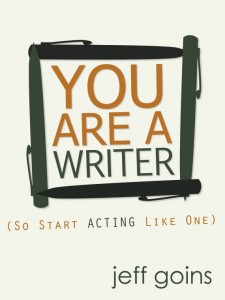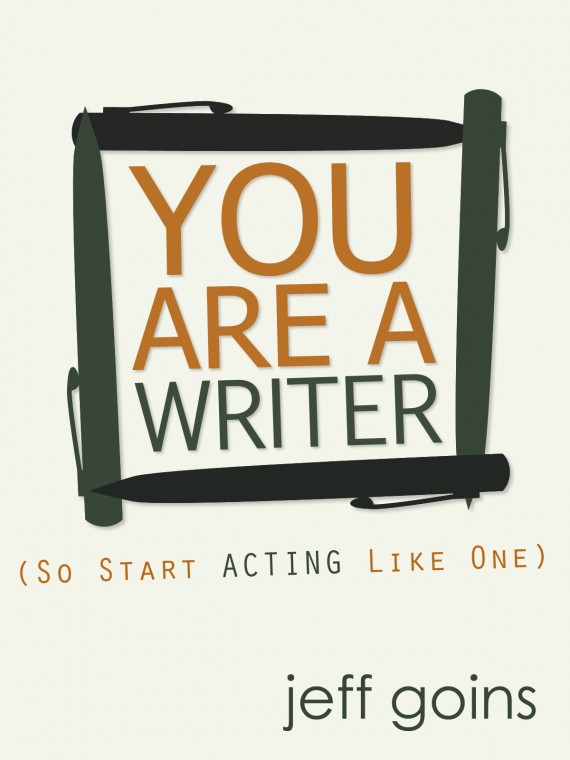 When you’re first starting out, the hardest part about writing is overcoming the fear of “putting yourself out there.” The fear of sounding foolish.
When you’re first starting out, the hardest part about writing is overcoming the fear of “putting yourself out there.” The fear of sounding foolish.
Will people read my work?
Will they like it?
What if they don’t read it?
What if nobody reads it? What if they think it sucks?
That voice, asking all of those questions and making you second-guess yourself… That’s the inner critic. He’s relentless, and if you give in, he’ll cripple your work.
If you really want to excel, all it really boils down to is sitting down and doing the work.
Jeff Goins, who writes Goins Writer, is someone who knows this all to well. He’s been there. In your shoes. He’s dealt with the self-doubting, inner critic. Rather than let it keep him from creating his art, he’s put in the work. All while having a full-time job, and a family. He works late evenings and early mornings to put in the work. In his words: “I put the time in and showed up — and I saw the results.”
In an impressive and short 8 months, his work reaches thousands upon thousands of people. So today, I’d like to share some of Jeff’s words of wisdom from his latest book…
Writing Lessons from “You Are a Writer (So Start Acting Like One)”
All of this — this business of becoming a writer — starts not with the hands, but with the head…
Writing is mostly a mind game. It’s about tricking yourself into becoming who you are. If you do this long enough, you being to believe it. And pretty soon, you start acting like it.
It all starts with the right mind-set. If you can’t get that right, you’re going to have a tough time both getting started creating your best work. You’ll always be wrestling with the inner critic – letting him get the best of you and keeping you from creating your art.
Well, that ends today. You are good enough. You are creative enough. And people do value your work (your art). We’re just waiting for you to get started.
//
You have to be yourself, to speak in a way that is true to you. This is the next step to reclaiming your life as a writer — taking yourself seriously so your audience will, too.
It’s ok to have mentors. People whose work you admire. But ultimately, you’ll have to create your own style and write in a voice that is unique to you. Once you do that, people will come to admire your work for the uniqueness that it brings.
To do this, you’ll have to write and create daily until you find your voice. Keep writing, keep creating and you’ll get there soon enough.
//
Some days, it’s enough of a chore just to put your butt in a chair and stay put. To create something. Anything. If you do this long enough, though, you start to create really good work…
Everything is practice. Every word you write and action you take is a chance to get better. This is the difference between professionals and amateurs. Pros are always looking for a chance to get better, to improve their craft just a little more.
Some days you’ll struggle. You’ll sit there, staring at a blank screen and the words just don’t seem to come out. I know because I’ve been there.
Other days, you won’t be able to type the words fast enough.
Still, you have to commit to showing up day in and day out. Put your butt in that chair and just start writing. You don’t have to publish everything you write, but you have to commit to writing daily. It’s like they say, “practice makes perfect.” If you don’t put the hours in, you’ll never get there.
//
If you are going to succeed as a writer, you are going to have to learn to be smart. To have thick skin. To be more than talented. You are going to have to be a marketer, an entrepreneur, a talented salesperson.
Because this is a business.
Writing is about creating. Doing the work (just like any other job). But it’s also selling… Selling people on your work. Working hard to earn their attention, keep it, and to keep creating and meeting expectations.
Thom Chambers authors The Micropublisher — an online magazine running through 2012. He’s a writer (and a good one). But he’s also running a business. He plays the role of marketer, entrepreneur and talented salesperson just as often as he’s creating.
//
You need a tribe — a focused group of followers to spread your message.
“Treating people with respect is the best way to earn their attention.” – Seth Godin
Ultimately, you need an audience to help spread your work. The quickest way to build an audience is:
- Be helpful. Help solve a problem.
- Care. Take a genuine interest in people. Thank them for taking the time to take an interest in your work. After all, without them, you have nothing.
***
If you’re a writer or an aspiring writer, Jeff’s book is a refreshing and motivating read. It’s a call to action to get up and put your best work forward. It’s not just words of motivation, it’s a plan of action for “how” to get it done.
I admire Jeff for the art he creates and the hard work he puts in to make it all happen.
Whether you’ve been at the business of writing for a while or you’re a newbie, pick up a copy of his book You Are A Writer (So Start Acting Like One). You’ll be glad you did!
Giveaway Contest:
I’m going to buy two copies of Jeff Goins book to give away. All you have to do is share your biggest writing challenge and one thing you plan to change to improve. Or, share your biggest writing challenge when you were first starting out, and tell us what you changed that made an improvement in your work.
Just leave a comment with your tip to enter.
Entries will close on Monday, May 7th at 3:00pm Pacific.


